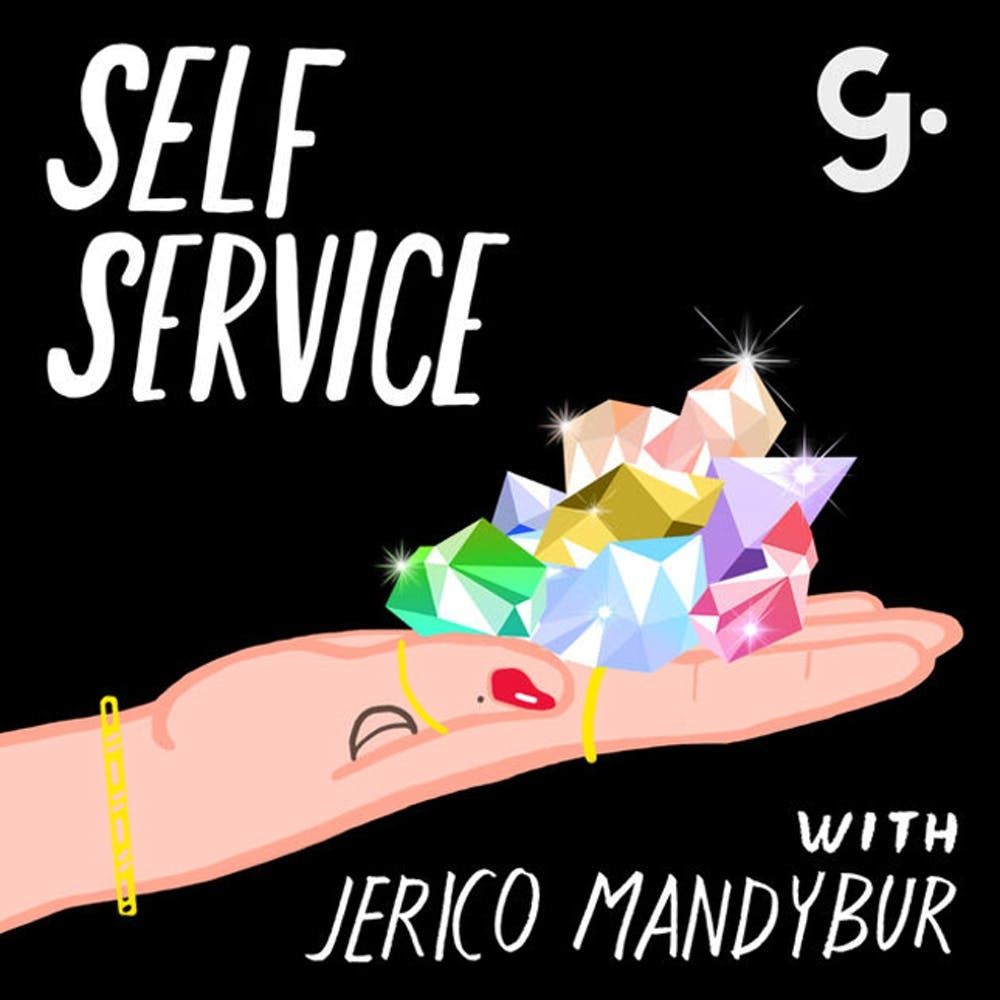Jerico Mandybur is a girlboss. Literally. The self-proclaimed “all-around witch” is editorial director of Sophia Amoruso’sGirlboss and host of the radio network’s second podcast, Self Service. The new series is like a wellness guidebook for the woke, with Mandybur as its guardian angel (and we’re not just saying that because of her halo of fluffy curls).

The weekly podcast tackles topics ranging from self-love to staying hydrated, with expert guests weighing in with thoughtful insight, disarming charm, and relatable humor. Mandybur gives a Tarot card reading each episode, while astrologer Jessica Lanyadoo explains the astrological forecast for the week ahead. It’s all in an effort to empower women to “self-care better” and demystify cosmic topics that the Capricornian among us may find too out there at first.
Plus, as Mandybur so aptly puts it, “it’s an opportunity to do nothing but relax for 20 minutes, on a Sunday.” Count us in. We chatted with Mandybur to get the self-service scoop (and hear her own tenants of regular self-care).
Brit + Co: Can you talk a little about how and why you decided to develop the Self Service podcast?
Jerico Mandybur: At Girlboss, we provide our community with the resources they need to redefine success on their own terms. Part of this means exploring our personal and professional well-being (and learning to take care of ourselves as an extension of that). I’ve become more and more interested in self-care in the last few years, as I began taking a more active role in looking after myself and healing from a traumatic childhood, and the mental health issues and chronic migraines that came with it. I’ve always kind of passively dealt with those things through psychiatry and psychology, which are great. But I wanted to take ownership over healing myself and incorporate spirituality. So that’s what I’ve done.
Self Service is meant to be a “cosmic comfort zone,” a resource and safe space for listeners to explore what self-care and spirituality mean for them.
B+C: What are you hoping to add to both the wellness and podcast spaces?
JM: I think there are so many people doing amazing stuff in this area, but Self Service aims to be an accessible and nonjudgmental way in to conversations about self-care and spirituality. Some new age-y (for lack of a better word!) spiritual podcasts I’ve heard don’t always explain terms and ideas for newbs, so I guess I want listeners to feel like it’s okay if you don’t already “get” what we’re talking about, and hopefully it will make you curious to learn more.
B+C: Do you have a wellness routine of your own? What do you like to do for a little self-care?
JM: I try to meditate every day for at least 20 minutes, usually at night. I have baths basically every night too. I read books and tarot cards, and because my “God” is nature, I pay attention to what the moon and seasons are doing and let that guide me in terms of personal rituals, e.g., setting intentions, journaling. I try to go for walks, do yoga and reiki here and there. I also try to get a massage once a month.
B+C: What’s the most meaningful thing you’ve learned about self-care since starting the podcast?
JM: Self-care is free, and it’s mostly about boundaries — this is the biggest one. Protecting your energy and time by being able to say “no” sometimes (which women aren’t always encouraged to do) is the foundation of self-care. I’ve learned it’s not about what you actively do, it’s more about where your attention goes.
B+C: On a similar note, what’s been the most surprising aspect of podcasting about wellness and self-care?
JM: Both self-care and new-age spirituality are being put under a microscope in the media right now, and that’s fine — they should never be exclusionary or prescriptive or a shallow marketing tool. So, I’m surprised by the amount of positive feedback, honestly. People have been really supportive and have reached out to say that they got something out of it. I think, and hope, they can tell that I’m coming from a very sincere place. And I’ve only gotten a few people telling me that witchcraft is Satan’s work, and that I need Jesus, which is great.
B+C: It feels like wellness is crossing over from being a passing trend to a daily necessity — why do you think this is?
JM: I’m not sure, but it’s something we are exploring in every episode of Self Service! For me, self-care and spirituality (and wellness more broadly) are very hard to remove from their political roots. I’m not sure that I would have embraced them had I not been abused, or not been from an immigrant background, or Queer, etc. These are tools that, traditionally, people sought because they have felt marginalized and didn’t have (or want) access to the same resources or treatment as other people. So I’d say their burgeoning popularity says something about the way more and more people are feeling disenfranchised or lost — burnt out, isolated from the community, etc. These are all valid complaints, and embracing self-care and spirituality to be truly reflective and improve your situation (and that of others) is a valid response.
What’s your go-to self-care ritual? Tweet us @BritandCo and tell us what keeps you zen!
(Photo via Jerico Mandybur; image via Self Service)


